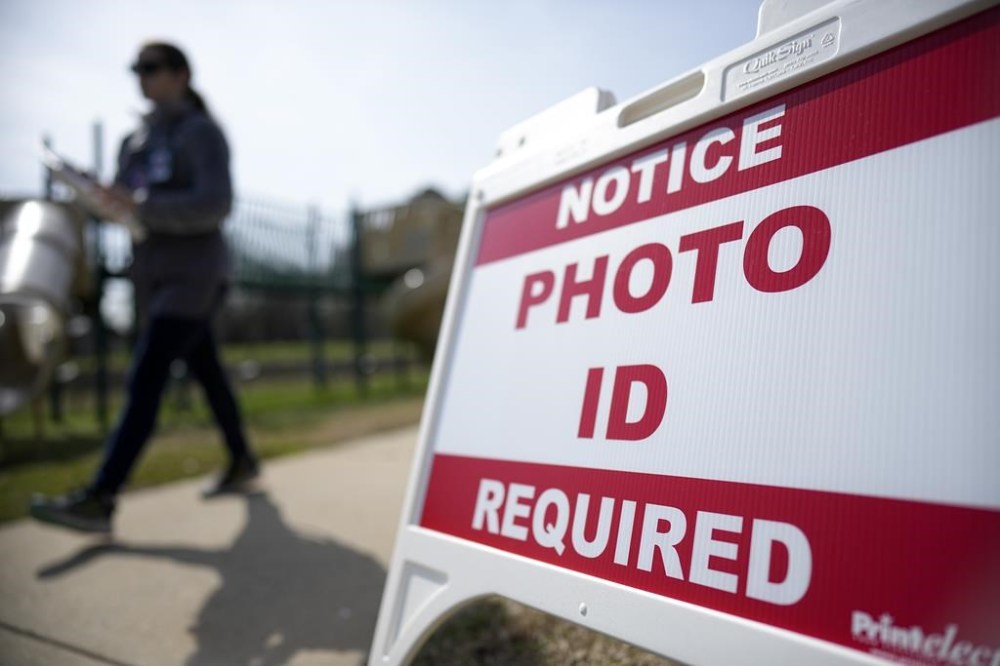Republicans challenge North Carolina decision that lets students show university’s mobile ID
Advertisement
Read this article for free:
or
Already have an account? Log in here »
To continue reading, please subscribe:
Monthly Digital Subscription
$0 for the first 4 weeks*
- Enjoy unlimited reading on winnipegfreepress.com
- Read the E-Edition, our digital replica newspaper
- Access News Break, our award-winning app
- Play interactive puzzles
*No charge for 4 weeks then price increases to the regular rate of $19.00 plus GST every four weeks. Offer available to new and qualified returning subscribers only. Cancel any time.
Monthly Digital Subscription
$4.75/week*
- Enjoy unlimited reading on winnipegfreepress.com
- Read the E-Edition, our digital replica newspaper
- Access News Break, our award-winning app
- Play interactive puzzles
*Billed as $19 plus GST every four weeks. Cancel any time.
To continue reading, please subscribe:
Add Free Press access to your Brandon Sun subscription for only an additional
$1 for the first 4 weeks*
*Your next subscription payment will increase by $1.00 and you will be charged $16.99 plus GST for four weeks. After four weeks, your payment will increase to $23.99 plus GST every four weeks.
Read unlimited articles for free today:
or
Already have an account? Log in here »
Hey there, time traveller!
This article was published 12/09/2024 (449 days ago), so information in it may no longer be current.
RALEIGH, N.C. (AP) — The Republican Party sued North Carolina’s elections board on Thursday to block students and employees at the state’s flagship public university from offering a digital identification as a way to comply with a relatively new photo voter ID law.
The Republican National Committee and North Carolina filed the lawsuit in Wake County Superior Court three weeks after the Democratic majority on the State Board of Elections approved the “Mobile UNC One Card” generated by the University of North Carolina at Chapel Hill as a qualifying ID.
The law says qualifying IDs must meet several photo and security requirements to be approved by the board. The UNC-Chapel Hill digital ID, which is voluntary for students and staff and available on Apple phones, marks the qualification of the first such ID posted from someone’s smartphone.

The Republican groups said state law clearly requires any of several categories of permitted identifications — from driver’s licenses to U.S. passports and university and military IDs — to be only in a physical form.
The law doesn’t allow the state board “to expand the circumstances of what is an acceptable student identification card, beyond a tangible, physical item, to something only found on a computer system,” the lawsuit reads.
The state and national GOP contend in the lawsuit that the board’s unilateral expansion of photo ID before registering and accepting voters at in-person poll sites “could allow hundreds or thousands of ineligible voters” to vote in the November election and beyond. North Carolina is a presidential battleground state where statewide races are usually very close.
An electronically stored photo ID may be easier to alter than a physical card and more difficult for a precinct worker to review, including when there are computer network problems, the lawsuit says. The groups also filed a separate request for a judge to issue a temporary restraining order or preliminary injunction preventing the use of the mobile ID.
In response to an email seeking a response to the lawsuit, a state board spokesperson pointed late Thursday to the board’s discussion at its Aug. 20 meeting.
A board attorney said during the meeting there was nothing in the law that specifically limits approval to printed cards. Board Chair Alan Hirsch, a Democrat, cited trends in technology in giving the ID his OK, saying that airline passengers now show boarding passes from their smartphones.
The current voter ID law was initially approved in late 2018. But it didn’t get carried out until the 2023 municipal elections as legal challenges continued.
The board has OK’d over 130 traditional student and employee IDs as qualifying for voting purposes in 2024, including UNC-Chapel Hill’s physical One Card. Someone who can’t show a qualifying ID casts a provisional ballot and either fills out an exception form or provides an ID before ballot counts are complete. In-person early voting begins Oct. 17.
People casting traditional absentee ballots also are asked to put a copy of an ID into their envelope. A board official said that UNC-Chapel Hill voters with the One Card can now insert a photocopy of the One Card displayed on their phones to meet the requirement.
The first absentee ballots were supposed to be distributed to voters who had requested one starting Sept. 6. But appeals court rulings declaring that Robert F. Kennedy Jr.’s name must be removed are forcing county elections official to reprint ballots. No new date for the start of the distribution of absentee ballots has been announced.

